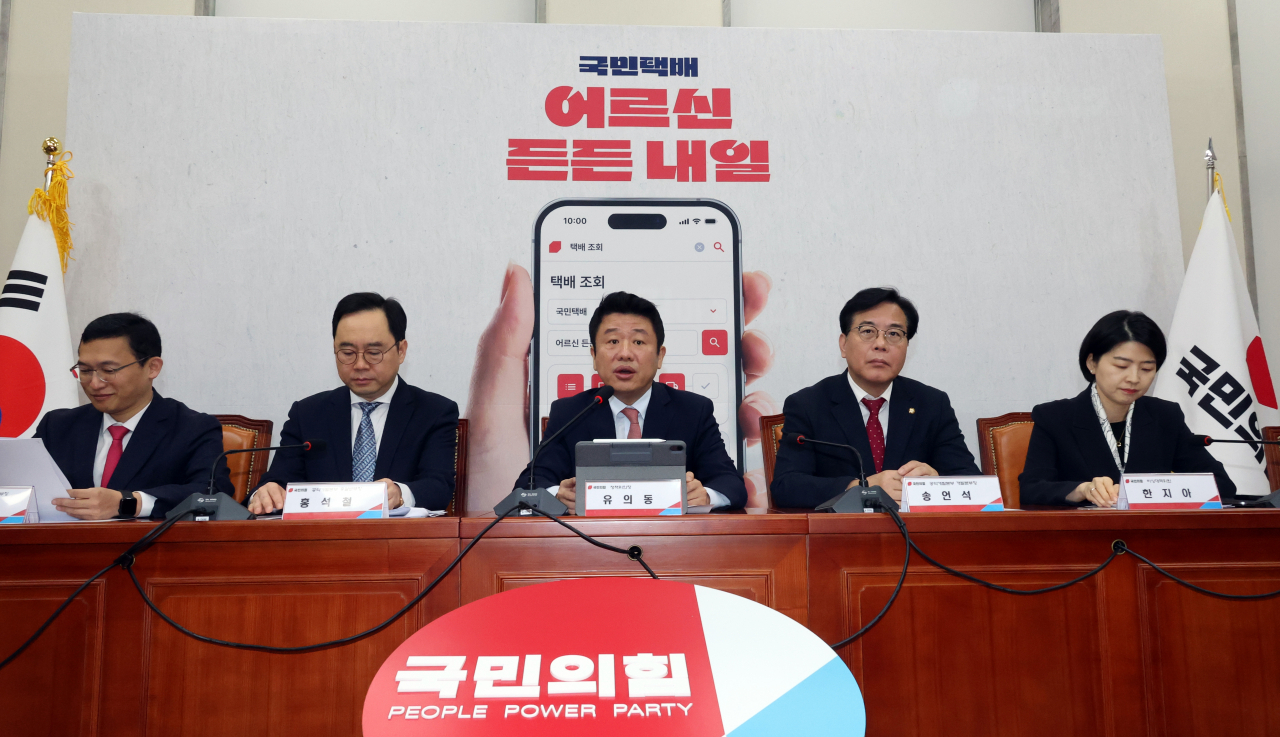 |
People Power Party lawmakers announce the party's latest pledge to improve the livelihoods of senior citizens in a briefing held at the National Assembly in western Seoul on Tuesday. (Yonhap) |
The ruling party on Tuesday announced a set of pledges aimed to improve the lives of senior citizens here, which includes tax benefits and an expanded free lunch system, as the country grapples with the issue of entering a super-aged society.
In its sixth pledge announced ahead of the general election on April 10, the People Power Party said it plans to expand the role of the government and taxpayers' money in taking care of Korea's older population.
"The government plans to launch and expand its own financial support program for care for seniors from 2027, but our citizens will continue to bear the burden of the cost of elderly care before (the program's implementation)," Yu Eui-dong, the party's chief policymaker said during a briefing held at the National Assembly.
Yu pointed to the Yoon Suk Yeol administration's plan announced in December last year, which aims to halve the cost of private spending on care for seniors. Korea's annual private spending on care for its older population has more than tripled to an estimated 10 trillion won ($7.5 billion) as of the end of 2022, compared with 3.6 trillion won as of end-2008, data recently released by Seoul National University.
"We will bolster the role of the government in bearing the financial cost of elderly caretaking in stages to establish a trustworthy environment for our senior citizens," he added.
The party seeks to update the country's state licensing system for care workers for seniors from 2025 to improve job conditions in nursing homes and retirement communities. While Korea does have a state license for certified care workers, critics have pointed out that many in the care work profession either continue to work without a license or fail to get a job even with the certification. This is mainly because of the lack of institutions that are legally allowed to afford and hire licensed caretakers as most of their salaries are funded by the government.
Yu highlighted that the update of the system will allow many of the care workers to benefit from a year-end tax deduction system.
The ruling party also plans to make installation of surveillance cameras across nursing homes and caretaking communities mandatory, to prevent any violence and crimes against senior citizens.
Giving a nod towards the issue of elderly poverty, senior citizens will be able to get free lunches at senior centers across the country more frequently. The program will be expanded from the current 4 days a week to the entire week, Yu vowed.
Korea is widely expected to become a super-aged society in 2025, in which the proportion of those aged 65 and older will hit 20 percent of the total population. The country became an aged society in 2017, as the proportion of such people exceeded 14 percent.
Those aged 65 and older reached 9.73 million out of the total population of 51.32 million as of the end of last year, accounting for 19 percent of the total pie, government data in January showed.
Asia's fourth-largest economy struggles with senior poverty as well with a recent Organization for Economic Cooperation and Development data showing that the relative poverty rate for Korean seniors aged 66 or older stood at 40.4 percent in 2020. The rate is a whopping three times the OECD average of 14.2 percent and placed Korea's older population as the poorest among the 38 member countries for 14 consecutive years since 2009.







